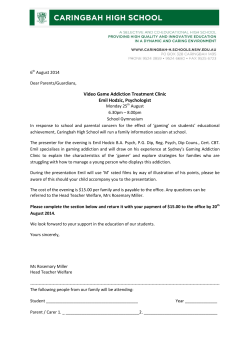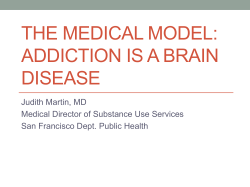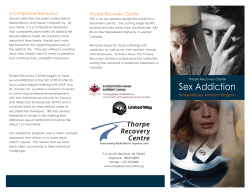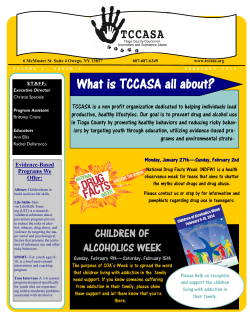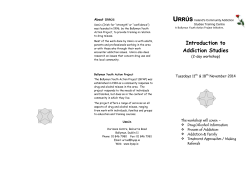
AMERSA Workshop Selections and Descriptions 2014 Thursday, November 6, 2014
AMERSA Workshop Selections and Descriptions 2014 Thursday, November 6, 2014 Overdose Prevention to Improve Opioid Safety in Clinical Practice: Naloxone Rescue Kits for Patients who use Opioids Facilitators: Phillip O. Coffin, MD, MIA, Alexander Y. Walley, MD, MSc and Michelle Geier, PharmD 1. Optimal communication and counseling with patients about overdose risk reduction 2. Prescribing, stocking and billing for naloxone rescue kits and related education 3. Collaborating with harm reduction programs to improve opioid safety overdose prevention Getting your Article from an Idea to a Peer Reviewed Publication in an Addiction Journal - A Behind the Scenes Look Involving the Editorial Process, Dos And Don'ts, Journal Metrics, and Maximizing your Articles' Impact on Addiction Science Facilitators: Adam J. Gordon, MD, MPH, FACP, FASAM and the Substance Abuse journal Editorial staff including Jennifer Jenkins, MPH In this workshop, an interactive format will be used to examine key author, editorial, and publishing steps from conception of an idea to publishing that idea in a reputable addiction journal. We will use case based studies, audience participation, and interactive quizzes to teach these skills. At the end of the workshop, each audience member will construct a cover letter to an editor regarding their scholarly work and will construct a narrative highlighting the impact of a recent work they have published for a potential press release. Creating a Collaborative "Road Map": Family-Based Harm Reduction Treatment Planning Facilitator: Stephanie Renno, LCSW At the termination of this workshop, the participants will have an outline for running a familybased treatment planning session for a client who is utilizing a harm reduction approach to making changes to substance use. The participant will have an understanding of the underpinnings of a harm reduction approach, as well as a specific step by step plan to lead a session. Friday, November 7, 2014 Treating Opioid Addiction using Buprenorphine within an Integrated Group Medical Visit Facilitators: Charles Preston, PhD, Sara Doorley, MD and Elizabeth Echeverria, LCSW Participants will learn how to develop an integrated, multidisciplinary team with the resources they currently have available in order to provide office based treatment using buprenorphine. They will learn techniques for actively involving patients with their treatment. They will also learn how to provide buprenorphine treatment within a group medical visit. Behavior Change in Our Patients and Ourselves: Interdisciplinary, Experiential Teaching to Improve Motivational Interviewing Skills in Clinical Practice Facilitator: Paul M. Grossberg, MD This highly interactive workshop is designed for clinicians and teachers to formulate individualized "practice and feedback" strategies to enhance and modify their own interviewing behaviors as they help patients change substance use behaviors. The "language" of SBIRT ought to be perceived by patients as consistently spoken by clinicians and providers at all levels through primary care and specialty clinics. Interdisciplinary, collaborative engagement with patients about behavior change forms a positive feedback loop with improving individual proficiency in MI. Practicing MI skills together, in healthcare learning communities, in small group role plays, or using audio or videotapes of actual clinician-patient conversations can improve provider skills and patient outcomes. Using Social Media to Teach and Disseminate Information about Addiction Facilitators: Christine Maynié-François, MD and Richard Saitz, MD, MPH 1. Identify legitimate and useful addiction information resources available on social media 2. Interact and share knowledge about addiction on social media 3. Create and implement educational content using different social media (Facebook, Twitter, Flickr, blogging.). The point of social media is precisely to be social, namely to interact with others. Therefore this workshop is meant to be mainly an interactive session. Participants will be asked to come with a laptop, tablet or smartphone. Saturday, November 8, 2014 Motivational and Cognitive-Behavioral Interventions for Diverse Adults with Methamphetamine Use Disorders Facilitators: Valerie A. Gruber, PhD, MPH, Abigail W. Batchelder, MA, MPH and Donna Whitfield, MA This workshop will help participants learn skills for motivational interviewing with methamphetamine abusers diverse in gender, sexual orientation and culture, drawing on presenters' clinical experience and training in motivational interviewing. Participants will learn to adapt communication to match the client's level of cognitive functioning, and to discuss harm reduction and sexual risk reduction strategies with methamphetamine users who are not ready or willing to pursue abstinence. A New Tool for Hard Times: Using Prescription Monitoring Programs to Reduce Drug Abuse Facilitator: Jeffrey Baxter, MD 1. Participants will learn how to access and assess the capacity of the PMP within their respective states. 2. Participants will learn limitations and potential sources of error within the function of current programs. 3. Participants will learn how to utilize the PMP to reduce abuse and diversion of prescription medications in a number of clinical situations, including pain management with opioids, the treatment of psychiatric conditions with benzodiazepines and stimulants, the treatment of opioid dependence with buprenorphine, and the treatment of substance abuse in general in specialized addiction treatment settings. 4. Participants will learn strategies for communicating with patients about the role prescription monitor programs will play in their care. 5. Participants will learn how to incorporate utilization of PMP’s into the education of health professions students. Integrating Dialectical Behavior Therapy with the Twelve Steps: A Non-Pharmacologic Approach to Managing Emotion Dysregulation in Addiction Treatment Facilitators: Bari K. Platter, MS, RN, PMHCNS-BC and Osvaldo Cabral, MA, LPC, CAC III This workshop will focus on the work developed and published by the presenters. The one-of-akind curriculum of “Integrating Dialectical Behavior Therapy with the Twelve Steps” incorporates the evidenced-based therapies of Dialectical Behavior Therapy (DBT) and Twelve Step Facilitation (TSF). Combined, these two therapies help strengthen clients’ recovery from substance abuse. The skills learned in DBT create balanced behavioral patterns that relate to many Twelve Step concepts. Passages from Twelve Step literature are used in this curriculum to reinforce DBT skills. In addition to utilizing traditional DBT skills in their curriculum, the presenters have also developed unique skills that draw from both DBT and TSF. Many addition treatment programs and mental health centers have used this dynamic curriculum (both in individual and group therapy) with great success. Participants will have the opportunity to review how DBT skills are found in Twelve Step literature and how Twelve Step philosophy is supported by DBT skills. In addition, participants will complete and discuss the use of worksheets that are found in the curriculum and have been developed by the presenters.
© Copyright 2025





